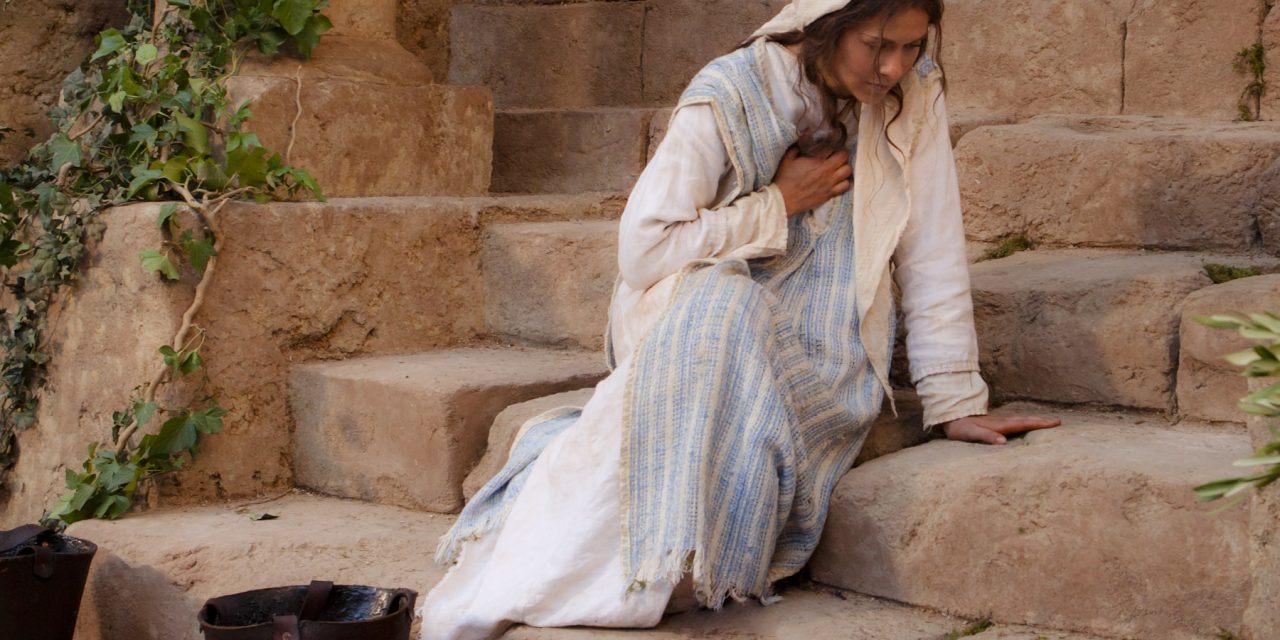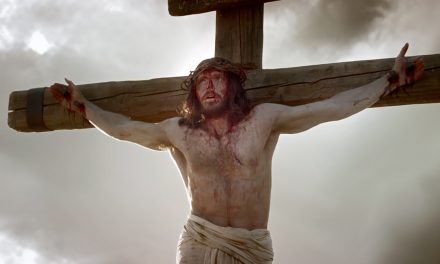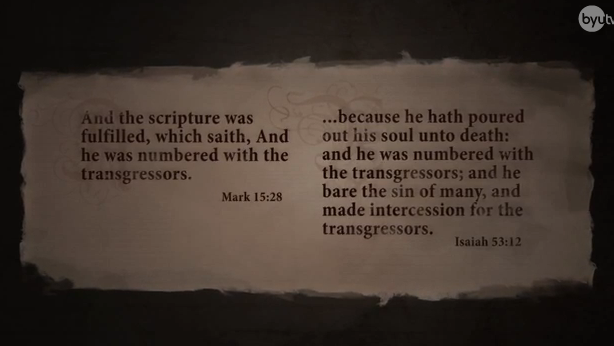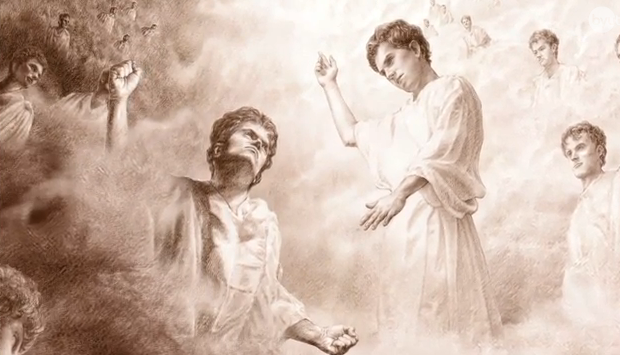S. KENT BROWN: Many months before the angel Gabriel appears to young Mary here in Nazareth, he visits an aged priest named Zacharias in the temple at Jerusalem, and proclaims to him that his wife shall bear a son, “and thou shalt call his name John” (Luke 1:13).
Months before the Messiah is born to the young maiden from Nazareth, the one who prepares the way for the Messiah is born to Elisabeth, Mary’s much older cousin.
“And Mary arose in those days and went into the hill country with haste, into a city of Judah, and entered into the house of Zacharias, and saluted Elisabeth. And it came to pass that when Elisabeth heard the salutation of Mary, the babe leaped in her womb, and Elisabeth was filled with the Holy Ghost, and she spake out with a loud voice and said ‘Blessed art thou among women, and blessed is the fruit of thy womb’” (Luke 1:42)
CAMILLE FRONK OLSON: Mary, who would become the mother of the Son of God, and Elisabeth, the mother of John, were cousins, according to the Luke Gospel. They would have known each other. They would have had opportunities to have interacted.
Elisabeth would finally, after decades, be able to bear a child, even a son. When that word started spreading around throughout the hill country of Judea, everyone would have been joyous with Elisabeth. This would have been a glorious and remarkable day. The fact that Mary found out that she was also with child could only become joyous if she understands through that spirit what this remarkable birth would mean—to her and to all the world.
She does come to visit Elisabeth, as the angel told her to do. And as they meet, they’re in the wilderness of Judea. Elisabeth, an elderly woman, long past the time of childbirth, meets this young, young—much younger than we like to imagine—Mary. I just can imagine, Mary must have had maybe a little trepidation. How does she?—she hasn’t told anybody, that’s not her role to tell anybody. Elisabeth comes to understand that she’s not the only one there with child. Rather than chastising Mary, saying, “What have you done; this is not a good thing!” Elisabeth starts praising God, and says, “How is it that you, the mother of the Son of God, should come to me?” ( see Luke 1:43). How did Elisabeth know that? Mary doesn’t tell her. We have no evidence of any angel appearing to Elisabeth. She simply tells us very clearly that the Holy Ghost spoke to her through her unborn child. John, an Elias, a forerunner, is already doing his job in bearing witness that the Son of God is about to be born.
In that remarkable moment, you can see the eye of God on those two women. There is not a lighter, brighter, more remarkable place or time on earth than what we see happening at that very moment. Mary and Elisabeth, who hold the future of all of us.
ANDREW C. SKINNER: Being in Nazareth gives us an opportunity to reflect on the betrothal of Joseph and Mary. In Jesus’ day, according to Jewish custom, when a young man and a young woman were to be betrothed, their respective fathers meet and agree on the wedding. From this point forward, the young man and the young woman are officially betrothed. Typically this arrangement lasts for one year. Then on the eve of the wedding, the women from both families meet with the young woman to exchange gifts, to give advice and to celebrate. It is unlikely that Joseph and Mary enjoyed much, if any, of these moments of happiness.
When we say literally that Joseph and Mary probably did not experience many happy moments from the time of their formal marriage after the betrothal, clear past the time that their firstborn son arrives, I think we’re talking literally, that there isn’t a lot of happiness, in terms of the social conditions, in terms of the normal customs of the day. But probably there was a lot of happiness in the courts on high.
ALISON COUTTS: I want to believe that Joseph believed everything that Mary told him. But nevertheless, he’s a carpenter; he’s very practical. And so he obviously thought long and hard about what he should do. They were betrothed, which is the same as them being married. And so he decided on a divorce, to put away privily. Privily in this case means privately. It wasn’t a public divorce, but it was something that he felt that he could do that would save her the death penalty.
Now the Lord intervenes with an angel, of course, and Joseph then is reassured. He knows the course that he can take that will be the right one, that he will be protected, that Mary, above all, will be protected.
JUSTIN SU’A: I like Matthew’s account, how he calls Joseph a just man in verse nineteen, because he was not willing to make her a public example, was minded to put her away privily. And it’s interesting to see that just the very thought of putting her away caused him grief. “But while he thought on these things, behold, an angel of the Lord appeared unto him in a dream” and taught him exactly who this child would be, and what his role would be, and what Mary’s role would be. And because of this experience, it turned him around, and after the angel’s visit, he became one hundred percent faithful to the commandments of the Lord, and loyal to his bride-to-be (Matthew 1: 19–25).
ALISON COUTTS: Bethlehem is about one hundred miles away from Nazareth. To equate it to today’s terms, Mary’s nine months pregnant; she’s been jostled on what’s the equivalent of a mountain track, on a donkey. Almost certainly they were with people. It would have been way too dangerous in those times to try and do the trek by themselves. But that would mean that there would need to be frequent stops, and it just would have been incredibly uncomfortable for her. And I imagine that, because by the time they got to the inn they were on their own, that there was no room for them, that somehow they got left behind. And there’s all this, the physical discomfort of all this, and on top of that, wondering “how can I give birth to the Son of God? What’s it going to be like?—how do I deal with that; how do I process that?” And yet their faith was strong, and they kept on, and they got there.
ERIC D. HUNTSMAN: If the evidence that Luke gives is correct, and people were coming from all over to be counted or perhaps prepared to be taxed, and if it were in the spring, as Latter-day Saints believe, Jerusalem was a very, very crowded place close to the Passover festival. There probably wouldn’t be room for everyone in Jerusalem itself. This is of course taking Luke at face value.
Of course, one of the things that’s a favorite part of the Christmas story for many of us is this image of the mean innkeeper that doesn’t have room for Him. But even this, we’re not as certain as we would like to be. When it says there was no room in the inn, the word inn is actually a translation of the Greek term kataluma, which can mean “inn”, and it can mean kind of a caravan stop, but it can also mean a guest room or an upper room. And in fact the only other time Luke uses the term, in Luke 22:11, is for the upper room that Jesus has prepared for the Last Supper. So we don’t have all the evidence, really, to re-create the picture of what’s exactly going on in Bethlehem. Could it have been a small community overflowing with pilgrims from neighboring Jerusalem, or perhaps a small community that’s overflowing with people who are enrolling in their ancestral birthplace? Perhaps. It may simply be that Joseph brought his new bride to Bethlehem because he had family connections there, and there wasn’t much room in the house. The guest room was full; she goes into labor, and the best privacy they could find was in the stable.
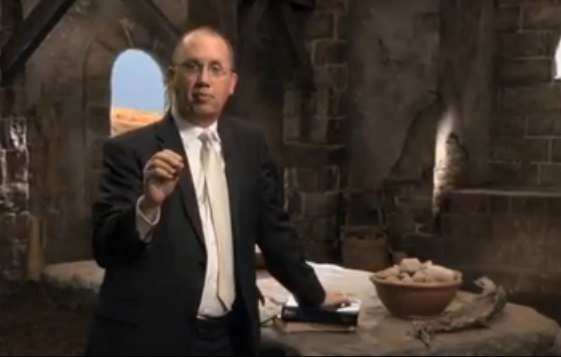 RICHARD HOLZAPFEL: Luke tells us that shepherds were in the field abiding. And probably—we assume that it’s the springtime—this kind of a setting is springtime—because there would have been the lambing, and there you have some extra concern and caution. There’s been some discussion; is it even possible that this is where the temple flocks were being watched? And of course, there for sacrifice they had to be without blemish. So again, extra concern, extra cautious in the lambing process, to make sure that no one’s injured, that the flocks are protected. And also from an economic standpoint, this is the time when the lambs are the most vulnerable, at birth, and so therefore you have these—apparently not just the traditional young boys who are watching the flocks, but maybe older, more mature, more experienced men, because it is an economic issue, it’s a religious issue.
RICHARD HOLZAPFEL: Luke tells us that shepherds were in the field abiding. And probably—we assume that it’s the springtime—this kind of a setting is springtime—because there would have been the lambing, and there you have some extra concern and caution. There’s been some discussion; is it even possible that this is where the temple flocks were being watched? And of course, there for sacrifice they had to be without blemish. So again, extra concern, extra cautious in the lambing process, to make sure that no one’s injured, that the flocks are protected. And also from an economic standpoint, this is the time when the lambs are the most vulnerable, at birth, and so therefore you have these—apparently not just the traditional young boys who are watching the flocks, but maybe older, more mature, more experienced men, because it is an economic issue, it’s a religious issue.
And they seem to be out in the field at this time, when all of a sudden, the announcement that the birth of the long awaited Messiah had finally come. And the shepherds, of course, overjoyed by it. And I’ve often thought that if in fact they were temple shepherds, how much more richly symbolic the story, that they are there watching over the birthing of the lambs that will be used in the most important and singular sacrifices at the temple: the lamb without blemish, and at that very moment, the Lamb of God was being born.
CLYDE J. WILLIAMS: You know, when the angels appear to the shepherds, this must have been of course clearly an unprecedented event for them. And they’re both startled and terrified at first. And then they realize the message. It’s not something that’s going to bring them any harm. But the important thing to me is, they go with haste. These shepherds are believers, and they’re excited and anticipating to go. And so they will head off into Bethlehem, and will begin looking throughout the city, searching to find this Messiah. Not unlike each of us, when we have learned about the Son of God, then we ought to be searching to understand him and to come to him and to find him.
S. KENT BROWN: I trust Matthew and Luke enough—they are reporting, Matthew very likely firsthand, Luke perhaps second- or third-hand, but based on eyewitness accounts. And I think it’s the eyewitness account which rises above everything else and says to me, yes, here is a real event. An angel came to that priest, an angel came to that little young woman in Nazareth, an angel came to those shepherds, and the story flows from there. And I accept it, I believe it, and take it at its word.
“Behold, the angel of the Lord appeareth to Joseph in a dream, saying, ‘Arise, and take the young child and his mother and flee into Egypt. And be thou there until I bring thee word, for Herod will seek the young child to destroy him.’ When he arose, he took the young child and his mother by night, and departed into Egypt. Then Herod, when he saw that he was mocked of the wise men, was exceeding worth, and sent forth and slew all the children that were in Bethlehem and in all the coasts thereof, from two years old and under” (Matthew 2:13).

